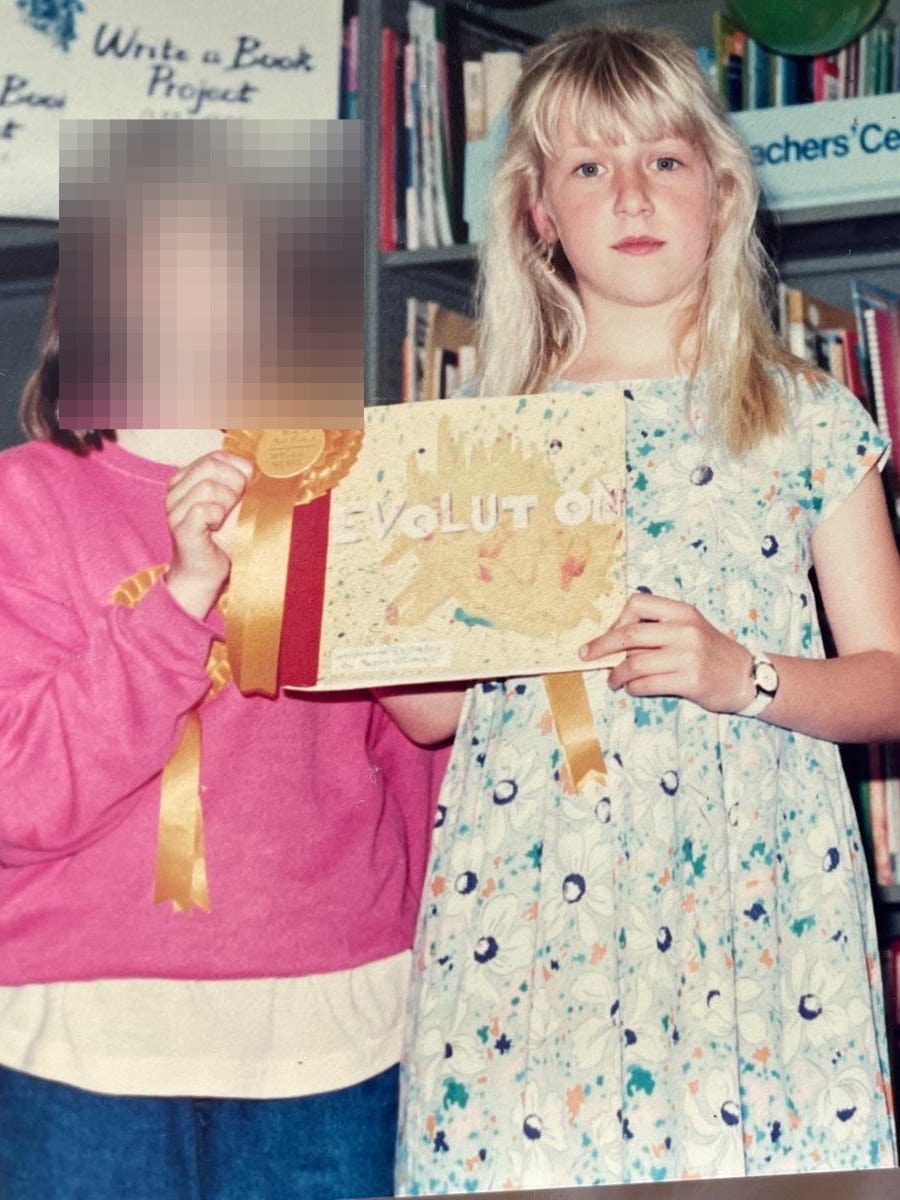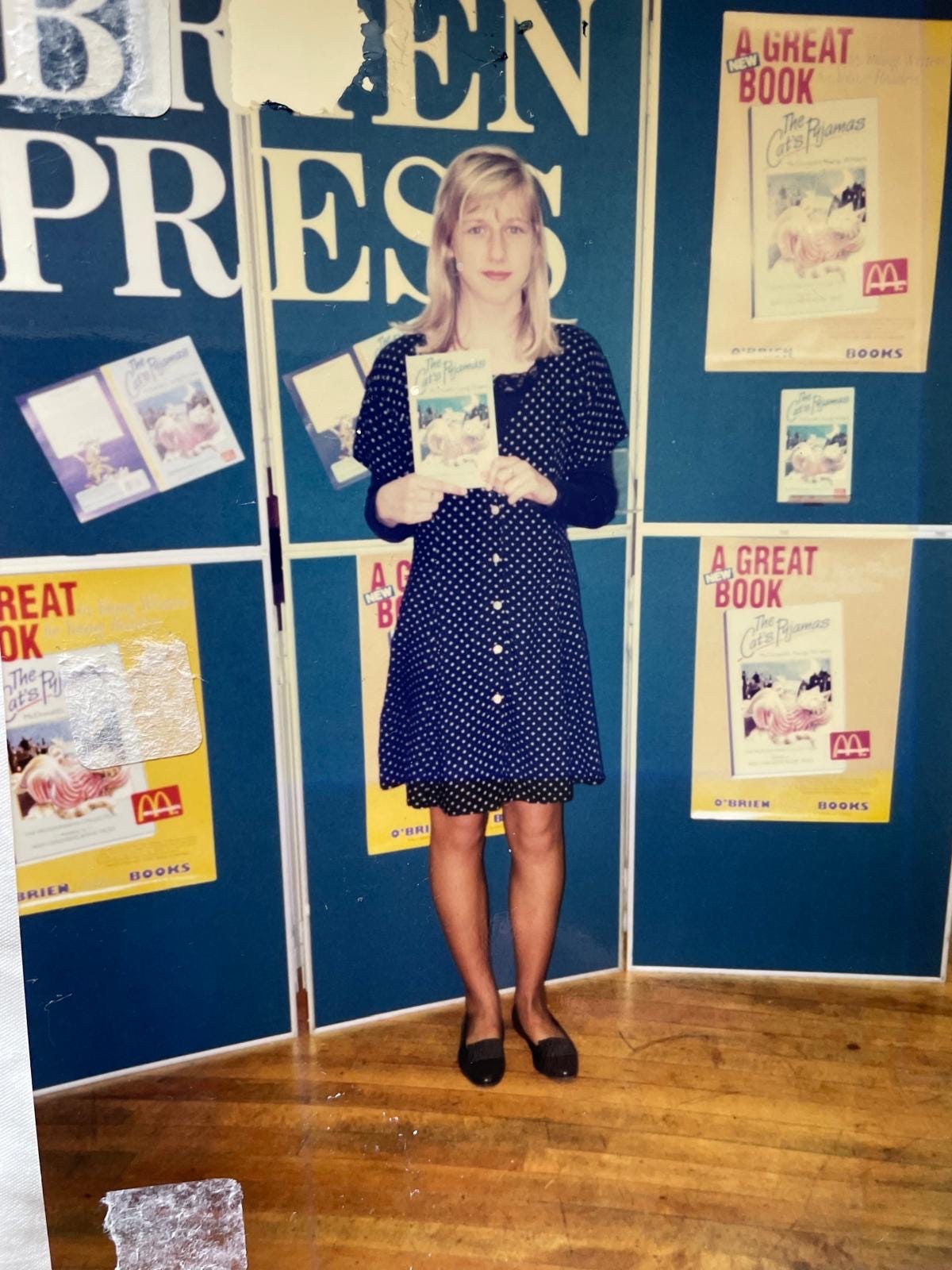on finding my groove
books i wrote as a girl, the decades i didn't write at all, where i'm at now
Hi friends,
Three quick announcements before we kick off this week’s post
1. For those of you interested in all things peri & menopause, keep an eye on your inboxes this Sunday for a really exciting offering I’ve created for a small, mighty group of us …. tune in Sunday for more!
2. Don’t forget next Wednesday 19:30-20:30 BST is our second MULCH MEETING - a chance to share your writing questions, writing wins or woes, what’s got you curious, what’s got you mad, what is currently inspiring you.
3. Our final Sitting in the Dark session for this spiral will be this coming Friday 20 June from 6-7am BST - see some of you there?
Ok, let’s begin!
Some of my earliest memories are of writing and of reading.
Torch under duvet reading after lights out.
Writing poems about my dead cat, or orphaned dogs.
It was about the pleasure of finding words that fit together well on the page. Words that made me feel a certain way.
It was also about the joy of the actual letters. The shape and heft and size of them.
I’d scrutinise other people’s handwriting and ‘steal’ letters I liked and incorporate them into my own alphabet. How the Celts wrote their ‘e’, how my step mother wrote her ‘n’, how my dad always used a capital R, even in the middle of a word.
Here’s a book a schoolfriend and I made in 1989. My third class school teacher held on to it for more than 35 years, and delivered it back to me recently, via a mutual friend. It surprised me how many of the details of the act of making it I remembered, how pleased I was to work out a satisfying rhyme (the poem about the old house was my favourite), my envy that I felt my friend had written a poem smarter than mine.
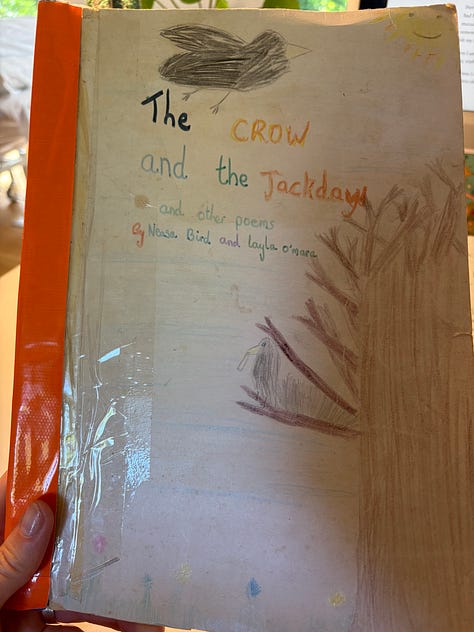
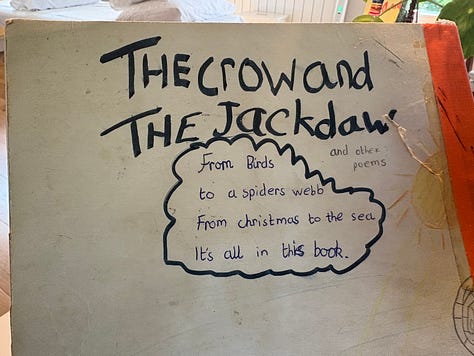
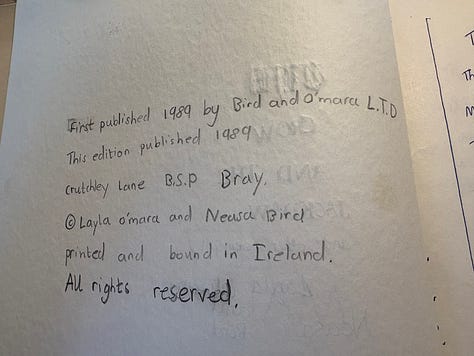
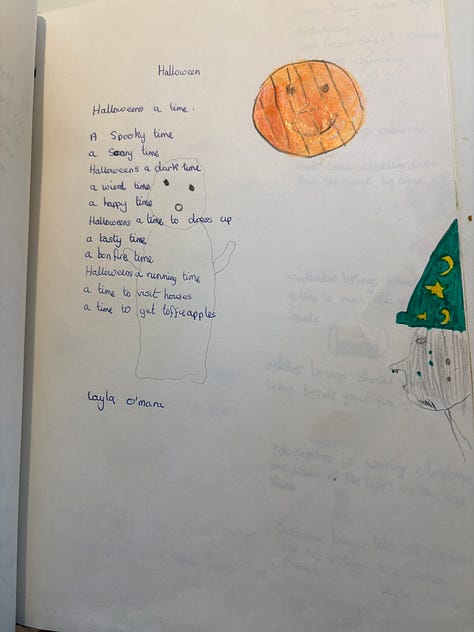
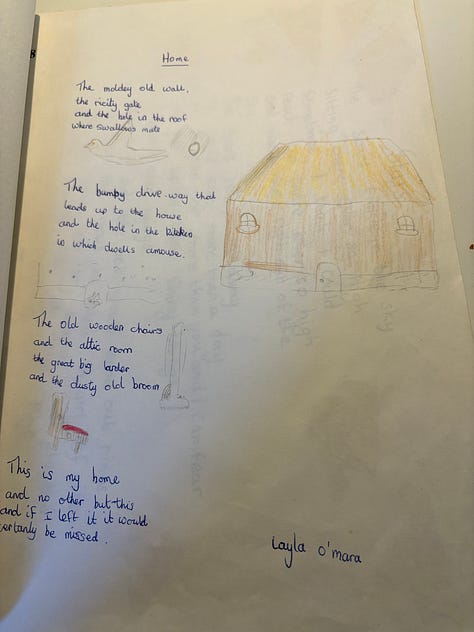
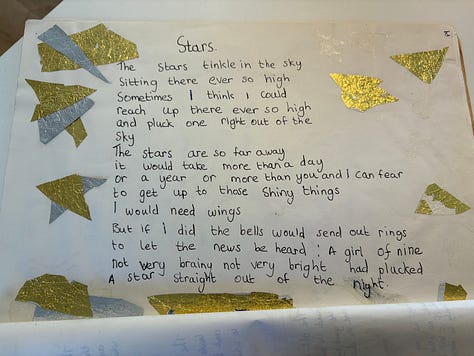
Here I am, also in 1989, receiving a prize for a book I wrote about Wilberforce, a stray, orphaned dog.
And here I am in 1992 with a copy of a book in which my short story about a slave on a slave ship was published.
I tell you all this because I know writing has always been there, since I was a little girl devouring Famous Five, Anne of Green Gables, The Hobbit, Stephen King, Patricia Cornwell - anything, really, that I could get my hands on.
But it took me a long time to find my way with writing. I wrote some plays in college, but often they were plays without many words - I was interested in how a body moved and told a story on stage.
I tried to write short tories and fiction, but I struggled to find my voice. There were years and years where I didn’t write at all. I did keep reading.
Two things happened around eight years ago that shifted my relationship with words. The first was that I discovered literary books written by writers about their own lives. Memoir that read like my favourite kinds of fiction. I read Emilie Pine’s Notes to Self over Christmas 2016. I was so excited about the way she had written about her own life. Intimate and true and compelling. I was also itchingly envious. I wanted to write some thing like that. I read Joan Didion’s A Year of Magical Thinking around then, too, and Maggie O’Farrell’s I am I am I am, both of which suggested to me ways to write about lived experience which I’d never considered before. And which excited me no end.
And then in the summer of 2017 I was hospitalised for three months while pregnant with my third child. I was confined to a bed a lot of the time; I bled heavily if I moved much at all. And, out of sheer boredom, I began to write a blog (on Tumblr - remember that!). The blog, which I called Wood for the Trees became a way to make sense of my days, to create something out of that strange time, to pass the time. And something, when I was forced to be still, clicked. At the risk of sounding massively cheesy, it felt like coming home. I was endlessly excited, endlessly interested, endlessly curious when I turned up to the page every morning in my hospital bed. So much so that once I was discharged after 91 days, I found it excruciatingly difficult, with a premature baby in NICU and two small children at home, that I no longer had that quiet contained space of my hospital bed where I could put pen to paper every day.
That tiny premature baby is now seven and a half. And I’ve kept writing. I’ve devoured 100’s of memoirs, endlessly fascinated by the myriad ways people can write about a life, endlessly fascinated by the remarkable lives people live, or the remarkable lens they see life through.
I’m surprised at how dogged my determination to write has been. I’ve had countless knock-backs, as any writer does. But not a single one has been unhelpful. I’ve learnt something about the craft, about my intentions, been forced to dig deeper, deeper, deeper. Get better, better, better. I am simply not going to stop until I get where I want to go. A book of mine in my hand. I say this while also knowing that it is the writing itself that is the thing. The moments on my own in the early morning with a notebook and pen, or as I bend to shut the dishwasher and an idea comes.
This week was a good week in my nudging towards a book in my hand. I was accepted onto the Irish Writer’s Centre National Mentorship Programme, and will be teamed with one of their incredible established writers as a mentor to work on the manuscript of my book. I couldn’t be more delighted. A final push! to get this book where I want it to go. Immensely exciting, quite scary, too.
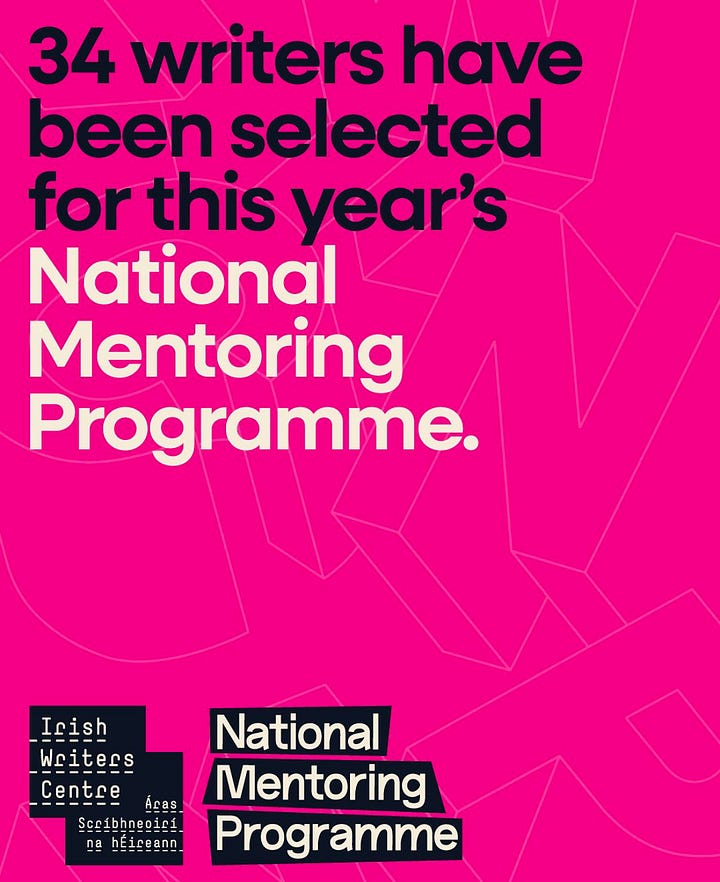
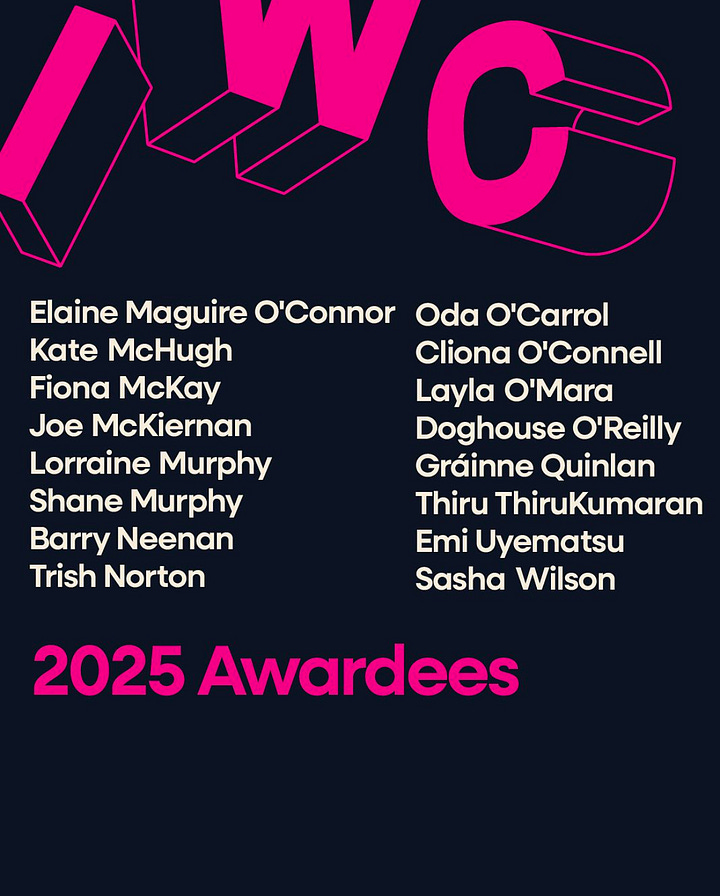
To wrap this trip down memory lane up, here are 5 things that have really helped me develop as a writer and kept me going, no matter what.
Find a champion who talks to you like a writer
When I started writing in earnest six or seven years ago, I felt like a complete imposter. There was no way I could have called myself a writer, and certainly didn’t think of myself as one. I was lucky enough to have a friend who was an established journalist and author and who read my work and gave me feedback as a writer. I can’t emphasise enough how important that was to me - to have someone who I respected speak to me that way. It was such a confidence boost. Writers groups are a great way to access this, too.Read Read Read. Other people’s books can teach you so so much. Start trying to read as a writer - what did they do there? how did they do that? what tense are they writing in? why did they shift perspective / tense there? how are they holding my attention? why am I not so engaged here?
Get something as good as you possibly can, and then wait a month, look at it with fresh eyes. and then be brave about sharing it.
I did this when I was pitching for an agent. In the first round of pitches I really felt I had got my work to the very best level I could. Looking back, it wasn’t yet ready, BUT by pushing myself as far as I could and then putting myself out there, I ended up getting invaluable feedback from some really well established agents that, whilst they ultimately said no, boosted my confidence no end and galvanised me to keep on going.
Be brave and show your words to other people - but be selective about who, and remember that not all advice is made equal.
Having readers and mentors has been invaluable to me as I’ve progressed - transformative experiences with mentors like
and at the and the wise readers Lily gathered for our series of workshops has helped me to be accountable and to push myself and to really refine what it is and how it is that I am writing. I’ve also been in writing groups that did not serve me so well, the feedback wasn’t constructive, I left feeling more confused than when I began. So I always remind myself that not all feedback is created equal and that there are different moments for different kinds of support, and also times for quiet internal reflection with no input at all.Just keep writing.
There are so many courses and masterclasses and supports out there, that it can feel distracting and overwhelming. There is a lot to be said for turning the noise down and just committing to turning up to the page, day after day, over and over, until what wants to be said is ready to emerge. And then you can refer to point no. 1, above.





